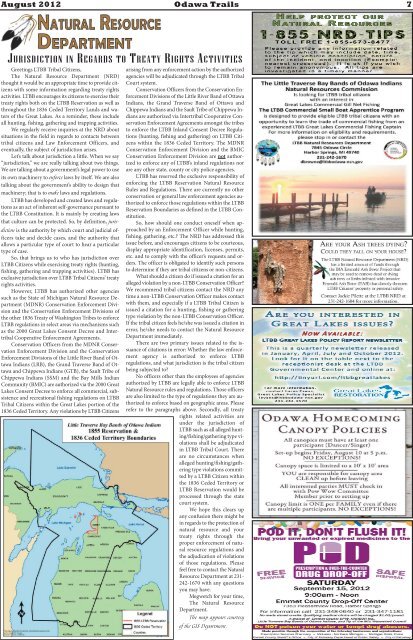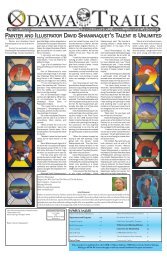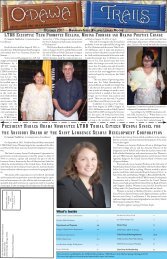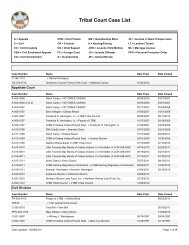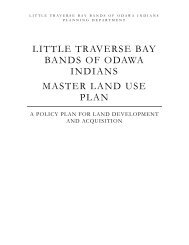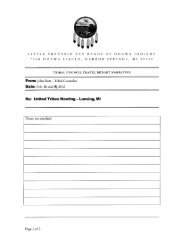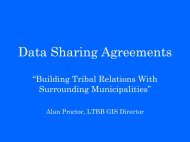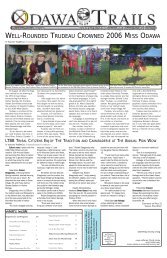August 2012 - Little Traverse Bay Bands of Odawa Indians
August 2012 - Little Traverse Bay Bands of Odawa Indians
August 2012 - Little Traverse Bay Bands of Odawa Indians
You also want an ePaper? Increase the reach of your titles
YUMPU automatically turns print PDFs into web optimized ePapers that Google loves.
<strong>August</strong> <strong>2012</strong> <strong>Odawa</strong> Trails<br />
7<br />
JURISDICTION IN REGARDS TO TREATY RIGHTS ACTIVITIES<br />
Greetings LTBB Tribal Citizens,<br />
The Natural Resource Department (NRD)<br />
thought it would be an appropriate time to provide citizens<br />
with some information regarding treaty rights<br />
activities. LTBB encourages its citizens to exercise their<br />
treaty rights both on the LTBB Reservation as well as<br />
throughout the 1836 Ceded Territory Lands and waters<br />
<strong>of</strong> the Great Lakes. As a reminder, these include<br />
all hunting, fishing, gathering and trapping activities.<br />
We regularly receive inquiries at the NRD about<br />
situations in the field in regards to contacts between<br />
tribal citizens and Law Enforcement Officers, and<br />
eventually, the subject <strong>of</strong> jurisdiction arises.<br />
Let’s talk about jurisdiction a little. When we say<br />
“jurisdiction,” we are really talking about two things.<br />
We are talking about a government’s legal power to use<br />
its own machinery to enforce laws by itself. We are also<br />
talking about the government’s ability to design that<br />
machinery; that is to make laws and regulations.<br />
LTBB has developed and created laws and regulations<br />
as an act <strong>of</strong> inherent self-governance pursuant to<br />
the LTBB Constitution. It is mainly by creating laws<br />
that culture can be protected. So, by definition, jurisdiction<br />
is the authority by which court and judicial <strong>of</strong>ficers<br />
take and decide cases, and the authority that<br />
allows a particular type <strong>of</strong> court to hear a particular<br />
type <strong>of</strong> case.<br />
So, that brings us to who has jurisdiction over<br />
LTBB Citizens while exercising treaty rights (hunting,<br />
fishing, gathering and trapping activities). LTBB has<br />
exclusive jurisdiction over LTBB Tribal Citizens’ treaty<br />
rights activities.<br />
However, LTBB has authorized other agencies<br />
such as the State <strong>of</strong> Michigan Natural Resource Department<br />
(MDNR) Conservation Enforcement Division<br />
and the Conservation Enforcement Divisions <strong>of</strong><br />
the other 1836 Treaty <strong>of</strong> Washington Tribes to enforce<br />
LTBB regulations in select areas via mechanisms such<br />
as the 2000 Great Lakes Consent Decree and Intertribal<br />
Cooperative Enforcement Agreements.<br />
Conservation Officers from the MDNR Conservation<br />
Enforcement Division and the Conservation<br />
Enforcement Divisions <strong>of</strong> the <strong>Little</strong> River Band <strong>of</strong> Ottawa<br />
<strong>Indians</strong> (LRB), the Grand <strong>Traverse</strong> Band <strong>of</strong> Ottawa<br />
and Chippewa <strong>Indians</strong> (GTB), the Sault Tribe <strong>of</strong><br />
Chippewa <strong>Indians</strong> (SSM) and the <strong>Bay</strong> Mills Indian<br />
Community (BMIC) are authorized via the 2000 Great<br />
Lakes Consent Decree to enforce all commercial, subsistence<br />
and recreational fishing regulations on LTBB<br />
Tribal Citizens within the Great Lakes portion <strong>of</strong> the<br />
1836 Ceded Territory. Any violations by LTBB Citizens<br />
arising from any enforcement action by the authorized<br />
agencies will be adjudicated through the LTBB Tribal<br />
Court system.<br />
Conservation Officers from the Conservation Enforcement<br />
Divisions <strong>of</strong> the <strong>Little</strong> River Band <strong>of</strong> Ottawa<br />
<strong>Indians</strong>, the Grand <strong>Traverse</strong> Band <strong>of</strong> Ottawa and<br />
Chippewa <strong>Indians</strong> and the Sault Tribe <strong>of</strong> Chippewa <strong>Indians</strong><br />
are authorized via Intertribal Cooperative Conservation<br />
Enforcement Agreements amongst the tribes<br />
to enforce the LTBB Inland Consent Decree Regulations<br />
(hunting, fishing and gathering) on LTBB Citizens<br />
within the 1836 Ceded Territory. The MDNR<br />
Conservation Enforcement Division and the BMIC<br />
Conservation Enforcement Division are not authorized<br />
to enforce any <strong>of</strong> LTBB’s inland regulations nor<br />
are any other state, county or city police agencies.<br />
LTBB has reserved the exclusive responsibility <strong>of</strong><br />
enforcing the LTBB Reservation Natural Resource<br />
Rules and Regulations. There are currently no other<br />
conservation or general law enforcement agencies authorized<br />
to enforce those regulations within the LTBB<br />
Reservation Boundaries as defined in the LTBB Constitution.<br />
So, how should one conduct oneself when approached<br />
by an Enforcement Officer while hunting,<br />
fishing, gathering, etc.? The NRD has addressed this<br />
issue before, and encourages citizens to be courteous,<br />
display appropriate identification, licenses, permits,<br />
etc. and to comply with the <strong>of</strong>ficer’s requests and orders.<br />
The <strong>of</strong>ficer is obligated to identify such persons<br />
to determine if they are tribal citizens or non-citizens.<br />
What should a citizen do if issued a citation for an<br />
alleged violation by a non-LTBB Conservation Officer?<br />
We recommend tribal citizens contact the NRD any<br />
time a non-LTBB Conservation Officer makes contact<br />
with them, and especially if a LTBB Tribal Citizen is<br />
issued a citation for a hunting, fishing or gathering<br />
type violation by the non-LTBB Conservation Officer.<br />
If the tribal citizen feels he/she was issued a citation in<br />
error, he/she needs to contact the Natural Resource<br />
Department immediately.<br />
There are two primary issues related to the issuance<br />
<strong>of</strong> citations in error: Whether the law enforcement<br />
agency is authorized to enforce LTBB<br />
regulations, and what jurisdiction is the tribal citizen<br />
being subjected to?<br />
No <strong>of</strong>ficers other than the employees <strong>of</strong> agencies<br />
authorized by LTBB are legally able to enforce LTBB<br />
Natural Resource rules and regulations. Those <strong>of</strong>ficers<br />
are also limited to the type <strong>of</strong> regulations they are authorized<br />
to enforce based on geographic areas. Please<br />
refer to the paragraphs above. Secondly, all treaty<br />
rights related activities are<br />
under the jurisdiction <strong>of</strong><br />
LTBB such as all alleged hunting/fishing/gathering<br />
type violations<br />
shall be adjudicated<br />
in LTBB Tribal Court. There<br />
are no circumstances when<br />
alleged hunting/fishing/gathering<br />
type violations committed<br />
by a LTBB Citizen within<br />
the 1836 Ceded Territory or<br />
LTBB Reservation would be<br />
processed through the state<br />
court system.<br />
We hope this clears up<br />
any confusion there might be<br />
in regards to the protection <strong>of</strong><br />
natural resource and your<br />
treaty rights through the<br />
proper enforcement <strong>of</strong> natural<br />
resource regulations and<br />
the adjudication <strong>of</strong> violations<br />
<strong>of</strong> those regulations. Please<br />
feel free to contact the Natural<br />
Resource Department at 231-<br />
242-1670 with any questions<br />
you may have.<br />
Megwetch for your time,<br />
The Natural Resource<br />
Department.<br />
The map appears courtesy<br />
<strong>of</strong> the GIS Department.


